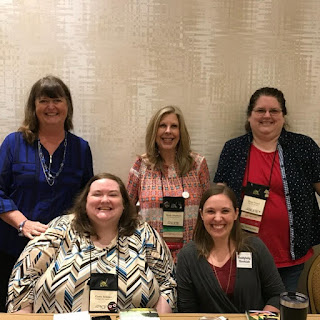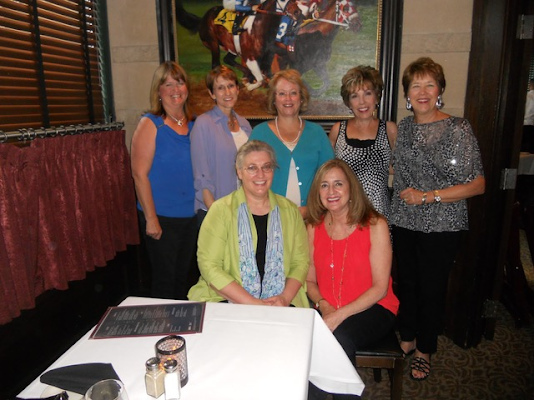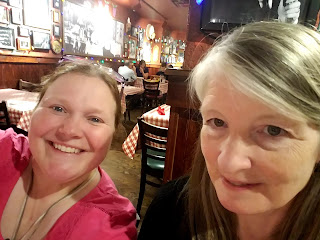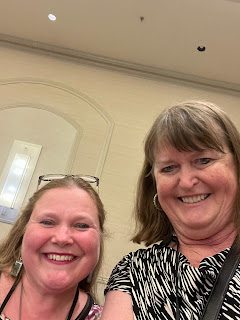Mary Connealy
Good night sweet blog. Parting is such sweet sorrow.
Yes, Seekerville is closing up. I hate it and I'm ready. This blog has meant so much to me. This outlet as a professional writer. This attempt we've all made to help others and express ourselves. There were so many people who helped me learn how to write. And when a group of authors and friends formed an email loop and were just having a ridiculous amount of fun, we decided maybe we had something to share with other aspiring authors.
Seekerville was born.
Giving it up feels wrong because it's been a home online for me for a long, long time. But it also feels right. The effort to find some new way to talk about the lessons of writing are hard. And I feel like I fail at it more often than I succeed. Or I repeat myself.
So I accept that we're putting our blog to bed for the last time today. Good night sweet blog.
Ruth Logan Herne
Seekerville was never just a blog.
It was a give-back from fifteen authors who prayed one another into royalty-paying publication.
In a time when self-publishing was raising its head and viability, these authors created a sisterhood of faith, hope and love… and met their goal! All fifteen authors were published and in the middle of that, when only a handful had gotten “the call” we decided to start a blog to help other aspiring authors. We believed in giving, helping, leading and encouraging.
We were and are blessed! It has given me countless friends and delightful readers and I will be forever grateful for both!
What Seekerville has meant to me…
Where do I start? We’re supposed to submit a paragraph, and I feel I could write a Julie Lessman-long post and not quite scratch the surface. When Seekerville started, I was a fledgling writer, absorbing everything I could about writing, the writer’s life, and books. I read every day, I commented so much, the original Seekers must have thought I was stalking them, and I learned so, so much. I loved that the Seekers spoke of more than just their own books, but brought in guest posters, too. One of those guest posts changed the way I write. (The Plot Board) I loved the sense of sisterhood, of support, and cheerleading the Seeker-Community provided. When Mary Connealy asked if I would like to join as a Seeker a few years ago, I was all over that opportunity. Though I knew every Seeker and had met them in person, I didn’t realize how our relationships would grow. We’ve shared the ups, the downs, the way downs, the way ups, and the way sideways bits of life, not just those concerned with writing, but with life. They have become a sisterhood, and I don’t say that lightly. I will miss the posts and the community of Seekerville, because it was something quite special. I’m glad the archives will be available for me to refer to when I need to learn or relearn something about the writing life…or just reminisce about some really good times.
So many memories…
As we know,
all good things must end, even Seekerville, although it is with a heavy heart
that I bid farewell. Your kindness and encouragement have touched me deeply,
and I’m so grateful. The memories of the love and laughter we shared will never
fade and will be special treasures that will warm my spirit in the years ahead.
Know that you are ever in my heart and in my prayers.
I love you all!
Debby Giusti
Janet Dean
I’m beyond blessed to have been a Seeker, one of 13 writers who joined forces to support each other on our journey to publication. When we started the blog Seekerville our intent was to share writing and industry tips meant to help ourselves and others along the way and to promote books with giveaways and prizes. We had a blast doing it while meeting and connecting with wonderful writers and readers! But what we ended up sharing the most were our lives! Writing is a solitary business and having this vibrant community to visit each day forged special connections and friendships we’ll always cherish! I learned oodles about writing from our posts, enjoyed the interaction both online and at writing conferences. But by far the best part of Seekerville was seeing ours and countless others’ dreams realized and celebrated in Seekerville! Though I’m retired and no longer write, I’ll always be grateful to have been part of it! Thanks to all who came, all who stayed, all who gave so much of themselves!

Back in the heyday of blogging, Seekerville stood out as a
safe place for up-and-coming authors to learn, share victories and
disappointments, and to cheer each other on. It was more than just a blog, it
was a community. Many authors attribute their success to Seekerville, and I’m
one of them. Iron sharpens iron. That’s what Seekerville has always been about.
And I’ve been honored to be a small part of it.
Julie Lessman
In
the fall of 2010, our family was in the middle of making one of our many
interstate moves. While I was in Kansas waiting for our house to sell and home
schooling our two youngest children, I felt the nudge to start the writing
career that had been pushed aside for years. As I searched the internet to find
out information on how to start this plunge into unknown waters, I stumbled
upon a blog. Fifteen authors – some published, some pre-published – were giving
advice for people exactly like me! And not only advice, but encouragement,
well-timed lessons, and a camaraderie that made that little corner of the
internet feel like home.
The
invitation to join the Seekers in 2017 was a dream come true! It was a
bittersweet time, though, as we said goodbye to so many original Seekers who
were retiring. I feel that same bittersweet feeling now, as times have changed,
and blogs are no longer the best way to reach aspiring authors. But you all
know where to find us, right? We’ll still be on social media – be sure to look
for us there!
Love
to all, Jan Drexler
Hmm, summing up what Seekerville is to me in one paragraph?
Impossible! There are innumerable memories rolled up in all the terrific
events, posts, discussions that have transpired over virtual brunches of
cinnamon rolls, red velvet cake and omelet bars, LOL. But, if I had to choose
one aspect of Seekerville I loved the most, it would be all the Seeker
Villagers who have touched my life over the years. As most know,
Seekerville was born as a group of unpublished authors banded together through
their love of contests and sought to pray each other into publication. Along
the way, we launched a blog to help other unpubbed authors learn about their
craft and offer encouragement along the way. As the Lord says (my paraphrase), Give
with a cheerful heart and He will bless abundantly (2 Cor 9:6-8). If there
was one thing you can say about Seekerville, we are a cheerful bunch and
approach each of our posts with joy, compassion, laughter and of course, virtual
food to feed the masses!!
For me personally, that joy and love was returned to me
beyond measure. Our Villagers are the heart of Seekerville and YOU made our
little safe haven of learning and love a place to cherish through all the ups
and downs of this crazy writing life. Thank you for your faithfulness and
encouragement as we shaked and shimmied our way through 16 years of love.
Bless you all, Audra
Glynna Kaye
“But seek ye first the kingdom of God, and his righteousness; and all these things shall be added unto you.” (Matthew 6:33)
That’s where it all started in 2005 when, through “meeting” each other in writing contest winners’ circles, God drew the original Seekers together. We shared industry news, teamed up to serve as beta readers, encouraged each other, challenged each other, prayed for each other--and became friends. Some soon escaped from “Unpubbed Island,” others of us gradually set sail one by one.
In the autumn of 2007--almost 16 years ago--we launched Seekerville The Blog, wanting to share with other writers what we were learning on our journey. We hoped that through sharing posts on our personal experiences, the craft of writing, the publishing industry, words of encouragement--and prayer for all--that other aspiring writers might attain their own publishing dreams. What came about during Seekerville’s “heyday” was a living, breathing, close-knit community of Seekers and the scores of fabulous and faithful “Seeker Villagers” who called the blog home! (A good number of whom are now published!)
I’m so grateful for my Seeker Sisters and all the many Villagers who joined us on the journey. THANK YOU! And thank you to our Heavenly Father who brought us together for a purpose and an amazing time in our lives!
Myra Johnson
I’ll always be grateful for the invitation back in 2005 that brought me together with 14 other determined writers in support, encouragement, and prayer for our journey toward publication. As one by one we began sailing off Unpubbed Island (some sooner than others!), creating the Seekerville blog in 2007 seemed like the perfect venue for giving back to the larger community of writers and to share what we were learning along the way. I am honored to have served as one of the original Seekerville bloggers during its first 10 years, and I’m thankful for the new Seekers who came on board after several of us “retired” to pursue other avenues in our writing careers. I will never forget Seekerville for all the writing tips, learning opportunities, laughter, and regular “kicks in the pants” that comprised our daily fare. Most especially, I cherish the friendships. You will all ALWAYS be in my heart! —Myra Johnson
Dana R. Lynn
So many thoughts are going through my head. Seekerville has been a part of my life ever since I began my writing journey in 2013. I remember the excitement of joining others for Speedbo, the Seeker version of NanoWriMo. I would read the posts to glean what wisdom I could as I pursued my dream. And continued afterwards when I received that first contract. But Seekerville was more than a resource. Through online interactions and in person meetings at conferences, I developed real friendships. It was an honor to join the Seekers for the past year. And while this is bittersweet, I know that the relationships I formed will last beyond the blog.
Blessings!

















